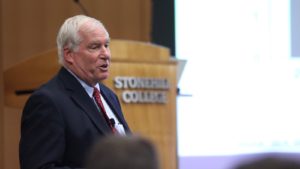The unemployment rate will likely rise at least as high as it did in the wake of the 2008 financial crisis, disproportionately hurting lower-income workers, and the country’s GDP appears on track for two quarters of negative growth as the coronavirus pandemic continues to take its toll, the head of the Federal Reserve Bank of Boston said Wednesday.
Providing some insight to the current economic picture and the steps taken by the central bank to keep the economy stable during a webinar hosted by the Greater Boston Chamber of Commerce, Boston Fed President and CEO Eric Rosengren said it is important for policymakers to remain agile and respond quickly as the virus determines precisely how the pandemic plays out.
Unlike the 2008 financial crisis, which was caused by issues with banks and financial markets, the current turmoil is driven by a public health emergency and isn’t one that the Fed’s monetary policy can remedy as simply.
“I would say that the economic recovery in this instance is primarily tied to the public health outcomes. But to the extent that the Federal Reserve can reduce the financial spillovers, both the severity of the recession that we’re likely to have and the duration of the recession we’re likely to have can be mitigated,” he said. “So, the purpose of many of the actions that we’re taking is trying to reduce the financial spillover, and as a result, keep as many people employed as possible through this period. And then when it’s time for the public health issues to have abated, to be able to make sure that we have as strong a recovery as possible.”
A ‘Cat 5 Hurricane’
Rosengren detailed the actions the Fed has taken so far: cutting short-term interest rates by 1.5 percent to nearly zero, having the New York Fed buy Treasury and mortgage-backed securities so the sellers can become more liquid, providing billions of dollars in loans to banks so that customers have access to cash, and removing some penalties for banks so lenders can restructure loans for people or companies that have lost income or revenue due to the pandemic.
He said the Fed’s forecast shows that the nation’s unemployment rate in the coming months will surpass 10 percent – it maxed out at 10.2 percent shortly after the 2008 financial crisis. Rosengren said the economy won’t be able to turn a corner “until people feel comfortable taking mass transit again” and returning to work.
Analysts at the Massachusetts Taxpayers Foundation this week took an initial look at the national economic impacts of the pandemic and some of what it could mean for Massachusetts.
“Simply stated, COVID-19 is a Cat 5 hurricane hitting global economies simultaneously,” MTF wrote in its analysis. “The initial impacts are staggering — to people and families, first responders, health care professionals, employers and employees, and the world’s economy. The scale and duration of the pandemic are as yet unknown.”
S&P Global Ratings wrote in a new report Wednesday that the COVID-19 pandemic has “pushed the world’s largest economies into near-hibernation.”
In another new report issued Wednesday, S&P economists marked down their projection for global growth to 0.4 percent this year, though they expect a rebound to 4.9 percent in 2021. The firm initially had projected a 3.3 percent growth rate for 2020, but reduced that down to 1 to 1.5 percent in a mid-March update.
“The policy challenges are enormous,” S&P Global Chief Economist Paul Gruenwald said. “Central banks and governments have moved quickly, pulling out all of the stops to keep the financial system functioning as orderly as possible, protect the most vulnerable and highly affected groups, and bridge to an eventual recovery.”
Asked about the outlook for U.S. GDP in 2020, Rosengren on Wednesday said he thinks it is “very likely that we’re going to have two negative quarters.”
Mass. Historically Hit Worse
MTF’s report looked at unemployment insurance filings and other data to consider how Massachusetts might fare in an eventual recovery. The group said Massachusetts has fared worse than the country as a whole in three of the last four recessions.
“There are several reasons to think Massachusetts will once again suffer a greater impact from the pandemic than the country as a whole, suggesting that the state’s recovery would be steeper and longer than other parts of the country. Massachusetts has nearly 1 million jobs likely to be affected by the economic shutdown,” MTF wrote.
Using data from Moody’s and initial unemployment insurance claims here, MTF said that Massachusetts “job losses could be in the 10 to 12 percent range, slightly higher than Moody’s U.S. estimate.” If that materializes, MTF said the Bay State stands to lose between 275,000 and 325,000 jobs in the second quarter of this year, and that about 190,000 fewer people will be employed in December than in January 2020.
On Tuesday, the Federal Reserve Bank of Boston released a report that looked specifically at how the pandemic is affecting the roughly two million workers in food service, cleaning, building maintenance, retail, hospitality, and warehouse work in New England. Those workers account for roughly one out of every five workers in the region.
“Massive numbers of service workers are being laid off as restaurants and stores scale down and close. At the same time, service workers in jobs categorized as essential are asked to come to work and face possible exposure,” the brief said. Its authors added, “The pandemic has the potential to exacerbate existing inequalities. Current policy responses … may mitigate some of these effects, but more is needed to enable equitable recovery from this crisis.”
Taking policy action that specifically aims to ease the economic devastation for service workers – who the Fed said disproportionately live in low-income households – will be critical, the brief’s authors wrote, because many of the workers most affected by the pandemic have also been left behind in the economic recovery since 2008.
“Following the Great Recession, the United States has seen a decade of steady economic growth. However, research has shown that even more than five years later, all the benefits of the recovery went to the top of the income spectrum. Even nine years later, low-wage workers saw no wage growth, and they continue to live with financial uncertainty throughout to the present crisis,” they wrote. “Over the past weeks, the nation has shown signs of entering a sudden and dramatic recession, one that is predicted to surpass the Great Recession in size and scope. It cannot be emphasized strongly enough that in contemplating policy solutions to bring New England through this crisis, the vulnerable low-wage service-worker population must be given special attention.”




 |
| 

